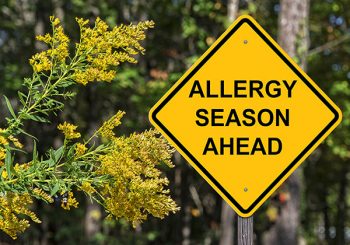 By Mia Barnes
By Mia Barnes
Guest Writer for Wake Up World
Summer is here — and with it the pollen and insects that can make this season a misery for allergy sufferers. You sniffle, sneeze and cough your way through the tulips instead of tiptoeing. In the age of COVID-19, you endure suspicious looks from strangers each time your symptoms show.
If allergies put a cramp in your summer style, you want to find relief quickly. However, many over-the-counter remedies come boxed with drowsiness as a side effect. Follow the tips below to ease your symptoms naturally so you don’t sleep through the season like Rip Van Winkle.
[pro_ad_display_adzone id=”110028″]
What Causes Allergy Misery?
Allergic reactions occur when your immune system cells misinterpret an innocuous foreign substance as harmful. As a result, it sends in the troops to battle the invader. When your white blood cells get going, you experience symptoms similar to the common cold — you cough and sneeze. You may get a sore throat. If you have a food allergy, you may experience gastrointestinal symptoms.
Your condition can range from mild to life-threatening. People have died from bee stings or ingesting peanut butter. Fortunately, in many, temporary discomfort is the worst problem — other than the skeptical side-eyes of strangers if they cough audibly.
How to Treat Allergies Naturally
How can you treat allergies naturally? The ideal approach depends on the substance causing the problem and your tolerance level. However, the following techniques can alleviate symptoms even if you can’t eliminate the cause.
1. Identify the Cause
If you’re not sick, what’s to blame for your symptoms? The best way to identify the problem is to have an allergy test or practice the elimination method. Food allergies often occur when you have a sensitivity to soy, milk, eggs, peanuts or seafood, although anything you consume could create a range of symptoms like bloating, nausea and even joint pain. An elimination diet can help you pinpoint the trigger.
Seasonal allergies prove more challenging to avoid unless you radically alter your environment. However, if your symptoms only appear when the ragweed blooms, you know the culprit. You might also have allergies to pets or cigarette smoke — you’ll recognize this cause if you only sneeze around kitties or feel nauseous when you walk by the smoker’s bench.
2. Ease Red Eyes
Seasonal allergies and exposure to indoor mold and pet dander can make you look like you haven’t slept in a week. Maybe you notice your eyes only grow itchy when you’re at work. If so, try putting a humidifier on your desk, as the moisture will help keep your peepers from drying out.
Another natural remedy involves using a compress. You can make a cold version by running a washcloth under cool water and holding it over your eyes for 10 minutes. Cold temperatures contract the inflamed blood vessels that cause itchiness. If you can’t bear the thought of a chilly rag in winter, you can warm the cloth.
3. Soothe Stuffiness and Sniffles
Steam is also your friend when it comes to stuffy noses. Lean over a sink, and drape a towel around your head and shoulders to retain the heat. Run the water hot enough to warm the air and breathe for several minutes. You can also try a Neti pot and saline to rinse out clogged nasal passages.
One remedy that has a cult following despite scant scientific evidence to support it is eating local honey. The theory is that the sticky stuff contains pollen from regional plants, and consuming it works like an allergy shot by lowering your body’s reaction to triggers. One study showed that eating it at a high dose for eight weeks did improve symptoms. However, exercise caution, as too much can spike your blood sugar.
4. Tame Tumultuous Tummies
Symptoms of food-related allergies vary from mild nausea to violent gastrointestinal distress. You can perform an elimination diet by listing the foods you eat most often. Then, identify which of these items is a likely culprit based on a common food allergies chart and try removing them from your diet. If your symptoms disappear, gradually add a bit of the suspected substance back into meals. If your vomiting and bloating reoccur, you have identified the problem.
5. Alleviate Widespread Pain
Because allergies engage your immune system response, you might endure painful flares if you have an autoimmune disease. Symptoms like the swollen joints seen in rheumatoid arthritis occur when your amped-up natural killer cells attack healthy connective tissue. When this happens, reach for the arnica cream, as it treats the inflammatory pain caused by autoimmune diseases.
Another natural remedy to try is to soak in a tea bath. Chamomile and lavender can relax muscle spasms, and turmeric with black pepper combats inflammatory pain. You can also sip a warm cuppa with a pain-relieving blend while you relax.
You don’t have to medicate yourself into Sleepy the dwarf if you have seasonal allergies. Eliminate the problem substance or use natural remedies to soothe your symptoms instead.
About the author:
Mia Barnes is an online journalist and Editor in Chief at Body + Mind.
[pro_ad_display_adzone id=”110027″]







